Nsg6101 - Study guides, Class notes & Summaries
Looking for the best study guides, study notes and summaries about Nsg6101? On this page you'll find 431 study documents about Nsg6101.
Page 4 out of 431 results
Sort by
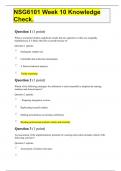
-
NSG6101 Week 10 Knowledge Check.
- Exam (elaborations) • 3 pages • 2023
-
- $7.99
- + learn more
NSG6101 Week 10 Knowledge Check. Question 1 (1 point) When a researcher obtains significant results that are opposite to what was originally hypothesized, it is likely that this occurred because of: Question 1 options: Inadequate sample size Unreliable data collection instruments A flawed statistical analysis Faulty reasoning
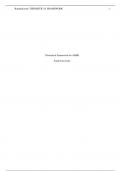
-
NSG6101_Week_5_Theoretical Framework Latest Review 2023 Practice Questions and Answers, 100% Correct with Explanations, Highly Recommended, Download to Score A+
- Exam (elaborations) • 4 pages • 2023
-
- $2.99
- + learn more
NSG6101_Week_5_Theoretical Framework Latest Review 2023 Practice Questions and Answers, 100% Correct with Explanations, Highly Recommended, Download to Score A+ Theoretical Framework Overview and Guiding Propositions The Health Belief Model (HBM) was developed in the 1950s to determine peoples’ resistance to participate in efforts to detect and treat diseases (Baum, Newman, Weinman, McManus, & West, 1997). In later years, the HBM was adapted to include ones’ responses and behaviors...
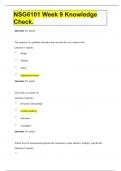
-
NSG6101 Week 9 Knowledge Check.
- Exam (elaborations) • 3 pages • 2024
-
- $10.49
- + learn more
NSG6101 Week 9 Knowledge Check. Question 1 (1 point) The measure of variability that takes into account all score values is the: Question 1 options: Range Median Mean Standard deviation Question 2 (1 point) The mode is an index of: Question 2 options: Bivariate relationships Central tendency Skewness Variability Question 3 (1 point) Which level of measurement permits the researcher to add, subtract, multiply, and divide? Question 3 options: Nominal
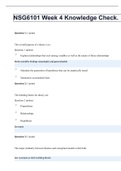
-
NSG6101 Week 4 Knowledge Check.
- Exam (elaborations) • 4 pages • 2023
-
- $10.49
- + learn more
NSG6101 Week 4 Knowledge Check. Question 1 (1 point) The overall purpose of a theory is to: Question 1 options: Explain relationships that exist among variables as well as the nature of those relationships Stimulate the generation of hypotheses that can be empirically tested Summarize accumulated facts Question 2 (1 point) The building blocks for theory are: Question 2 options: Propositions Relationships Hypotheses Question 3 (1 point) T...
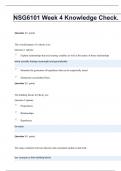
-
NSG6101 Week 4 Knowledge Check.
- Exam (elaborations) • 4 pages • 2024
-
- $10.99
- + learn more
NSG6101 Week 4 Knowledge Check. Question 1 (1 point) The overall purpose of a theory is to: Question 1 options: Explain relationships that exist among variables as well as the nature of those relationships Stimulate the generation of hypotheses that can be empirically tested Summarize accumulated facts Question 2 (1 point) The building blocks for theory are: Question 2 options: Propositions Relationships Hypotheses Question 3 (1 point) T...
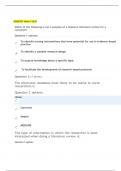
-
NSG6101 Week 3 QUIZ
- Exam (elaborations) • 3 pages • 2023
-
- $10.99
- + learn more
NSG6101 Week 3 QUIZ Which of the following is not a purpose of a research literature review for a consumer? Question 1 options: To identify nursing interventions that have potential for use in evidence-based practice To identify a suitable research design To acquire knowledge about a specific topic To facilitate the development of research-based protocols Question 2 (1 point) The electronic database most likely to be useful to nurse researchers is
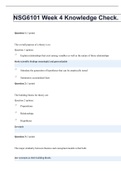
-
NSG6101 Week 4 Knowledge Check.
- Exam (elaborations) • 4 pages • 2023
-
- $9.99
- + learn more
NSG6101 Week 4 Knowledge Check. Question 1 (1 point) The overall purpose of a theory is to: Question 1 options: Explain relationships that exist among variables as well as the nature of those relationships Stimulate the generation of hypotheses that can be empirically tested Summarize accumulated facts Question 2 (1 point) The building blocks for theory are: Question 2 options: Propositions Relationships Hypotheses Question 3 (1 point) T...
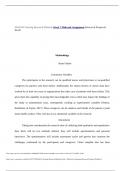
-
NSG 6101 SU_NSG6101_W2_Project_Alimole NSG6101 Nursing Research Methods Week 7 Midweek Assignment Research Proposal Draft.
- Other • 4 pages • 2023
-
- $9.49
- + learn more
Methodology Heart Failure Extraneous Variables The participants in the research can be qualified nurses and physicians or un-qualified caregivers for patients with heart failure. Additionally, the chosen doctors or nurses must have worked for at least two years in organizations that takes care of patients with heart failure. This gives them the capability of giving their knowledgeable views which may impact the findings of the study in unintentional ways, consequently working as experimen...
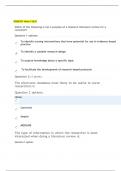
-
NSG6101 Week 3 QUIZ
- Exam (elaborations) • 3 pages • 2024
-
- $11.99
- + learn more
NSG6101 Week 3 QUIZ Which of the following is not a purpose of a research literature review for a consumer? Question 1 options: To identify nursing interventions that have potential for use in evidence-based practice To identify a suitable research design To acquire knowledge about a specific topic To facilitate the development of research-based protocols Question 2 (1 point) The electronic database most likely to be useful to nurse researchers is Question 2 option...
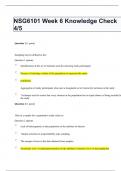
-
NSG6101 Week 6 Knowledge Check 4/5
- Exam (elaborations) • 4 pages • 2024
-
- $11.99
- + learn more
NSG6101 Week 6 Knowledge Check 4/5 Question 1 (1 point) Sampling may be defined as the: Question 1 options: Identification of the set of elements used for selecting study participants Process of selecting a subset of the population to represent the entire population Aggregation of study participants who meet a designated set of criteria for inclusion in the study Technique used to ensure that every element in the population has an equal chance of being included in the stu...

How much did you already spend on Stuvia? Imagine there are plenty more of you out there paying for study notes, but this time YOU are the seller. Ka-ching! Discover all about earning on Stuvia


